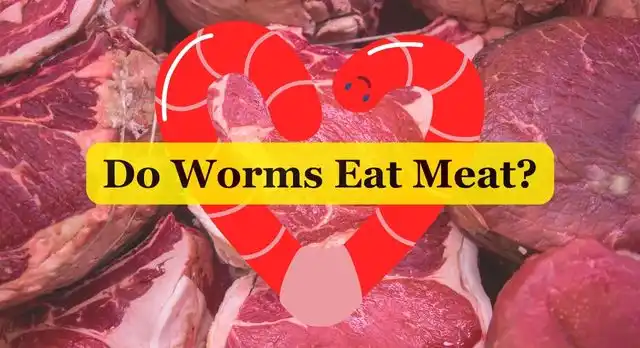Do Worms Eat Meat? Unveiling the Truth
When we think of worms, we often associate them with soil and organic matter. But what about meat? Are worms capable of consuming such protein-rich food? In this article, we will explore the surprising world of worms and answer the burning question: do worms eat meat? Prepare to be amazed as we dive into the intriguing habits of these underground creatures and uncover the truth about their dietary preferences.

Do Worms Eat Meat?
Yes, worms can indeed eat meat, but it’s not their natural or preferred food source. Worms are primarily detritivores, feeding on decaying organic matter like leaves, plant material, and other decomposing substances. However, in certain conditions, worms can consume meat if it’s available to them.
What Types of Meat Do Worms Eat?
While worms generally prefer plant-based organic matter, they can consume meat under specific circumstances. Here are some types of meat that worms may eat:
Rotting Flesh: Worms may feed on rotting flesh if it’s present in their environment. This could occur, for example, if a dead animal is buried in the soil, providing a source of decaying meat.
Meat-Based Compost: In controlled environments, such as compost bins or vermicomposting systems, worms can be introduced to meat-based compost. This compost consists of a mixture of vegetable scraps and meat waste, which worms may consume alongside the plant material.
Fish Waste: In aquaponic or fish farming systems, where fish waste accumulates, worms can play a beneficial role in breaking down the organic matter, including fish scraps.
How Worms Process Meat?
When worms consume meat, it goes through their digestive system, much like any other organic matter. Worms possess a specialized organ called the gizzard, which helps grind the food they consume, including meat. The digestive enzymes in the worm’s gut aid in breaking down the organic matter further.
It’s important to note that worms have a slower digestive process when it comes to meat. Meat takes longer to decompose compared to plant material, so it may remain in the worm’s system for a longer period before being fully processed.
Considerations and Precautions
While worms can eat meat, it’s crucial to exercise caution and consider a few important factors:
Proper Balance: In vermiculture or composting systems, maintaining a proper balance of materials is essential. Meat should be added in moderation, alongside an adequate amount of carbon-rich materials like dry leaves or shredded paper.
Odor and Attraction: Meat can produce strong odors and attract pests if not properly managed. It’s important to bury the meat waste well within the compost pile or vermicomposting system to minimize odors and prevent unwanted visitors.
Quality of Compost: Meat-based compost can be challenging to manage, and if not done correctly, it may not reach optimal temperatures for proper decomposition. This can result in incomplete breakdown and potential pathogen survival.
Worms and Sustainable Waste Management
While worms can eat meat, it’s crucial to consider the broader context of sustainable waste management. Incorporating worms into composting systems can be an eco-friendly way to manage certain types of organic waste, including meat scraps. However, it’s important to ensure proper balance, hygiene, and adherence to composting guidelines to mitigate potential risks.
Conclusion
In conclusion, worms are primarily detritivores that feed on decaying organic matter. While their natural diet consists of plant-based materials, worms can consume meat in specific circumstances. Understanding the role of worms in decomposition and their adaptability to different food sources allows us to appreciate their contribution to sustainable waste management. So, the next time you come across a worm, remember their versatility and the important role they play in maintaining the delicate balance of ecosystems.
Key Takeaway
Worms, primarily detritivores, can eat meat under certain conditions, although it’s not their preferred food source. Incorporating worms into composting systems can provide an eco-friendly solution for managing meat scraps and other organic waste. However, it’s crucial to follow proper guidelines, maintain balance, and ensure hygiene to promote effective decomposition and minimize potential risks.
Related Guide
Do Worms Eat Roots? Unveiling the Truth
Do Worms Eat Mushrooms? Feeding Habits of Earthworms
Do earthworms eat rotting meat?
Yes, earthworms can eat rotting meat under certain conditions. While their primary diet consists of decaying plant matter, if there is rotting meat present in their environment, earthworms may consume it. However, it’s important to note that meat is not their natural or preferred food source.
What kind of worms eat meat?
Various types of worms can eat meat, including some species of earthworms. Red wigglers (Eisenia fetida) and European nightcrawlers (Eisenia hortensis) are two common types of worms that are known to consume meat in certain situations. However, it’s important to provide a balanced diet and ensure proper waste management practices when feeding worms meat.
Can worms eat raw meat?
Worms can eat raw meat, but it’s important to exercise caution. Raw meat can be challenging for worms to break down and decompose compared to other organic matter. If you choose to feed worms raw meat, it’s crucial to do so in moderation and ensure that the meat is properly balanced with other organic materials. Additionally, care should be taken to prevent odor and attract pests by burying the meat waste well within the compost or vermicomposting system.
